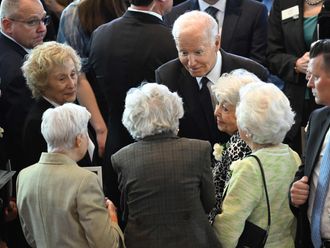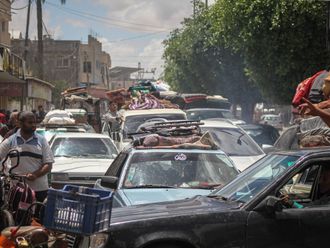CAIRO: Just days after the worst terrorist attack in Egypt’s modern history, President Abdul Fattah Al Sissi on Wednesday gave his security forces a three-month deadline to restore “security and stability” in the troubled northern Sinai, the epicentre of an increasingly brutal insurgency.
In a televised ceremony marking the birthday of Prophet Mohammad (PBUH), Al Sissi authorised his new chief of staff, Major General Mohammad Farid Hegazy, to use “all brute force” against the militants.
Hegazy, appointed last month, rose up from his front-row seat and stood in rigid attention as Al Sissi, a general-turned-president, addressed him.
“I am mandating Maj. Gen. Mohammad Farid Hegazy before you and the entire people of Egypt to restore security and stability in Sinai,” said Al Sissi. “With God’s benevolence and your efforts and sacrifices, you and the police will restore security and use all brute force, all brute force.”
This is the second time since Friday’s horrific massacre in a sleepy Sinai village that Al Sissi ordered the use of “brute force” against the militants. It was not immediately clear what the use of such force would entail, but it suggested a scorched earth tactic that many of the president’s loyalists in the media have been calling for.
Friday’s attack on a mosque in the northern Sinai village of Al Rawdah was the deadliest assault by extremists in Egypt’s modern history. Among the 305 dead were 27 children; another 128 people were wounded.
Daesh hasn’t yet claimed responsibility for the mosque attack but the over two dozen gunmen who unleashed explosives and gunfire to mow down the worshippers during Friday prayers carried the black banner of the militant group. The mosque belonged to followers of the Sufi movement, considered by Daesh to be heretics. Militants have in the past targeted them in Sinai as well as elsewhere, like in Iraq.
Egypt’s military and police have for years been waging a tough and costly campaign against militants in the towns, villages and desert mountains of northern Sinai. In the past year, militants have bombed churches in the capital of Cairo and other cities, killing dozens of Christians.
A local affiliate of Daesh now spearheads the insurgency. It is believed to have been behind the October 2015 downing of a Russian passenger jet that killed all 224 people on board, decimating the country’s vital tourism sector.
The insurgency has gathered steam and on occasion spread to the mainland following the ouster in 2013 by the military, then led by Al Sissi, of Mohammad Mursi, an Islamist president whose one year in office proved divisive. Also, a series of recent attacks in Egypt’s vast Western Desert suggests the opening of a new front. Authorities believe attacks there are carried out by militants based and trained in neighbouring Libya.












